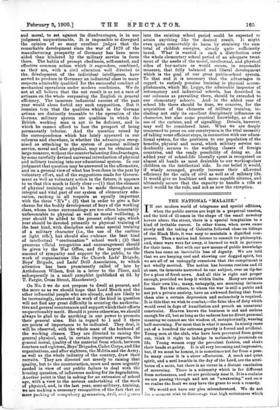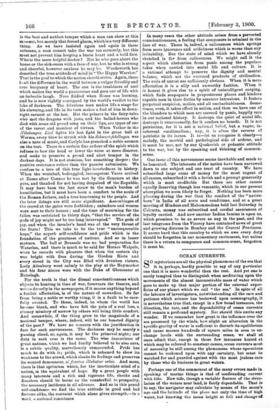THE NATIONAL "MALAISE."
IN our modern world of telegrams and special editions, when the public nerves are kept in a perpetual tension, and the bird of ill-omen in the shape of the small newsboy hovers about the street, there is a special temptation to a kind of irritable unrest. In other times, when news came slowly and the taking of Calcutta followed close on tidings of the Black Hole, it was easy to maintain a dignified com- posure. Then a nation had leisure to consult its philosophy, and, since wars were far away, it learned to wait in patience for their issue. But with our new means of public knowledge there has come an inevitable loss of dignity. We are told that we are keeping cool and showing our dogged spirit, but we are all of us unhappily conscious that the compliment is not wholly merited. The nation has become restless and ill at ease, its interests narrowed to one subject, ever on tip-toe for a piece of fresh news. And all this is right and proper enough, provided we keep it within limits. Many are anxious for their own kin ; many, unhappily, are mourning intimate losses. But the others, to whom the war is still a public and not yet a private anxiety, have an awkward feeling that from them also a certain depression and melancholy is required. It is this that we wish to combat,—the false idea of duty which would revel in days of humiliation and preach an unnatural conetraiut. Heaven knows the business is sad and serious enough for all, but so long as the sadness has no direct personal meaning we cannot see the wisdom of, metaphorically, wearing half-mourning. For most that is what it means. In ninety cases out of a hundred the extreme gravity is forced and artificial. Young men at the club, who have been prevented from going out, think it right to indulge in melancholy jeremiads on life. Young women copy the prevalent fashion, and shake their heads at gaiety. It is all very becoming and impressive, but, if we must be honest, it is sometimes not far from a pose. In many cases it is a sheer affectation. A meek and quiet spirit, and a soul humble in the day of the Lord, are the attri- butes oQ a saint, but there is no virtue in a distant emulation of mourning. There is a solemnity which is far different from seriousness, and we are perilously near it. It is a malaise we are passing through and not an "awakening," and once we realise the fault we may have the grace to seek a remedy.
We would not have our plea misunderstood. We do not for a moment wish to discourage that high seriousness which is the best and noblest temper which a man can show at this moment, but merely that forced gloom, which is a very different thing. As we have insisted again and again in these columns, a man cannot take the war too earnestly, but this must not prevent him keeping a brave heart and a bold face. Who is the more helpful doctor P Not he who goes about the house or the sick-room with a face of woe, but he who is strong and cheerful, however anxious be may be. Wordsworth has described the true attitude of mind in "The Happy Warrior." That is the goal to which the nation should strive. Again, there h all the difference in the world between a vulgar frivolity and true buoyancy of heart. The one is the trashiness of soul which makes the world a pantomime and goes out of life with an imbecile laugh. Nero fiddled when Rome was burning, and he is now rightly consigned by the world's verdict to the lake of darkness. The frivolous man makes life a stage for his clowning, and life in its turn makes a fool of him in down- right earnest at the last. But the princes in the fairy-tales who met the dragons with jests, and the ballad-heroes who died with some old proud song on their lips, are types of one of the rarest and manliest of virtues. When Volker in the Nibelungen Lied fights his last fight in the great hall at Worms, every blow he struck with his Schwert-jidelbogen was also a note of music, and Carlyle has preached a noble sermon on the text. There is a certain fine ardour of the spirit which refuses to bow the head or lower the voice at mere disaster, and seeks to preserve a proud and alert temper in the darkest days. It is not stoicism, but something deeper : the positive resistance rather than the passive submission. We confess to a love of this true light-heartedness in history. When the wretched, bedraggled, incompetent Varro arrived at Rome after Cannae he was met by the Senators at the gate, and thanked for not having despaired of the Republic. It may have been the last straw to the man's burden of humiliation, but it must have been a comfort to the souls of the Roman fathers, and a true heartening to the people. And the later doings are still more significant. Assemblages of the crowd at the gates were forbidden ; onlookers and women were sent to their houses ; and the time of mourning for the fallen was restricted to thirty days, "that the service of the gods of joy might not be too long interrupted." The gods of joy, and when the invader's hand was at the very throat of the State! This we take to be the true " unconquerable hope," the superb self-confidence and pride which is the foundation of the greatness of nations. And so in lesser matters. The ball at Brussels was no bad preparation for Waterloo, and there is much to be said for Horace Walpole, when he records with pleasure that when the eastern sky was bright with fires during the Gordon Riots and every street in the City was filled with drunken rioters, Lady Ailesbury went calmly to the play at the Haymarket and his four nieces were with the Duke of Gloucester at Ranelagh.
For the truth is that the dismal conscientiousness which objects to hunting in time of war, forswears the theatre, and writes drearily in the newspapers, if it means anything beyond a foolish affectation, is of the nature of cowardice. So far from being a noble or worthy thing, it is a fault to be care- fully avoided. To those, indeed, to whom the world has become blank, and who have felt the pain of a real loss, a clumsy mimicry of sorrow by others will bring little comfort. And meanwhile, if the thing grew to the magnitude of a national temper, where, indeed, will be oar boasted dignity of the past P We have no concern with the justification in fact for such nervousness. The darkness may be merely a passing cloud, or, again, it may be the primeval night; our duty in each case is the same. The wise insouciance of great nations, which we had fondly believed to be also ours, is a subtle quality, marvellously compounded. Pride has much to do with it; pride, which is ashamed to show its weakness to the crowd, which cloaks its feelings and preserves its wonted demeanour, si fractus illabatur orbis. And more, there is that optimism which, for the inarticulate mind of a nation, is the equivalent of hope. By a great people with many interests and a rich and vigorous life, checks and disasters should be borne as the counterfoil to prosperity, the necessary incidents in all advance. And so in this proud self-confidence we find the true attitude in good and bad fortune alike, the restraint which alone gives strengtb,—in a word, a national conscience In many cases the other attitude arises from a perverted conscientiousness, a feeling that composure is criminal in the face of war. There is, indeed, a callousness which springs from mere ignorance and selfishness which is worse than any irritability. But the state of mind which we have already sketched is far from callousness. We might call it the aspect which abstention from panic among the populace takes when carried into social life and culture. It is a rational attempt to preserve the dignity and mental balance, which are the assumed products of civilisation. The evils of unrest are sufficiently obvious. When it is mere affectation it is a silly and unworthy fashion. When it is honest it gives rise to a spirit of unintelligent carping, which finds scapegoats in preposterous places and hinders capable men in their duties by amateur intrusions. It fosters perpetual suspicion, malice, and all uncharitableness. Some- times, even, it takes effect in action, and then we have one of the blunders to which men are coerced by panic, happily rare in our national history. It destroys the quiet of social life, destroys it unnecessarily, for it confers no benefit. It is not patriotism, for it is not a rational belief, but a vague, in- coherent emotionalism ; nay, it is often the reverse of patriotic in its issues. It is—let us recognise it clearly—a malady, the morbid and pathological side of ardour, and it must be met, not by any Quakerish or pedantic attitude to the war, but by the speaking and thinking of common- sense.
One issue of this nervousness seems inevitable and much to be lamented. The interests of the nation have been narrowed down to one subject and one tract of country. We have subscribed large sums of money for the most urgent of all causes, subscribed it with a lavish and a prompt generosity which is most creditable. But there are other causes equally deserving though less romantic, which in our present absorption we seem likely to forget. Nothing has been more pleasing during the war than the conduct of the " native- born " in India of all sorts and conditions, and at a great meeting of Hindoos and Iffahommedans held last Saturday in Calcutta, money was subscribed and cordial assurances of loyalty carried. And now another Indian famine is upon us, which promises to be as severe as any in the past, and the last telegrams from the Viceroy have contained news of great and growing distress in Bombay and the Central Provinces. It seems hard that this country to which we owe every duty should be forgotten in our momentary excitement, but unless there is a return to composure and common-sense, forgotten it must be.







































 Previous page
Previous page